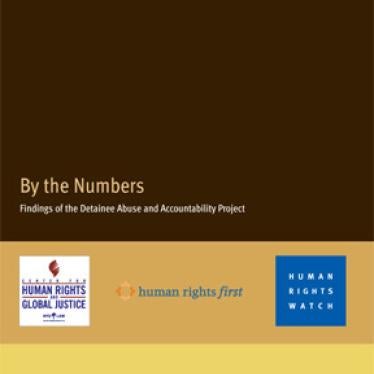(Washington, D.C.) – Two years after the Abu Ghraib scandal, new research shows that abuse of detainees in U.S. custody in Iraq, Afghanistan, and at Guantánamo Bay has been widespread, and that the United States has taken only limited steps to investigate and punish implicated personnel.
A briefing paper issued today, “By the Numbers,” presents findings of the Detainee Abuse and Accountability Project, a joint project of New York University’s Center for Human Rights and Global Justice, Human Rights Watch and Human Rights First. The project is the first comprehensive accounting of credible allegations of torture and abuse in U.S. custody in Iraq, Afghanistan and Guantánamo.
“Two years ago, U.S. officials said the abuses at Abu Ghraib were aberrations and that people who abused detainees would be brought to justice,” said Professor Meg Satterthwaite, faculty director of the Center for Human Rights and Global Justice at NYU Law School. “Yet our research shows that detainee abuses were widespread, and few people have truly been brought to justice.”
The project has collected hundreds of allegations of detainee abuse and torture occurring since late 2001 – allegations implicating more than 600 U.S. military and civilian personnel and involving more than 460 detainees.
The project found that many abuses were never investigated, and investigations that did occur often closed prematurely, or stalled without resolution. In cases where abuses were substantiated and perpetrators identified by military investigators, military commanders often chose to use weak non-judicial disciplinary measures as punishment, instead of pursuing criminal courts-martial. Of the courts-martial that did take place, the majority resulted in either prison sentences of less than a year, or punishments that did not involve jail time (such as discharge or rank-reduction).
“We’ve seen a series of half-hearted investigations and slaps on the wrist,” said Tom Malinowski, Washington advocacy director for Human Rights Watch. “The government seems more interested in managing the detainee abuse scandal than in addressing the underlying problems that caused it.”
The project found that the vast majority of those who were investigated for abuse were enlisted military personnel, not officers. Under military law, officers can be held accountable for the abuses of their subordinates under the doctrine of command responsibility. The project did not find a single case in which an officer was held accountable under that doctrine.
“There’s been a failure of accountability for detainee abuse at the command level,” said Elisa Massimino, Washington director for Human Rights First. “Without accountability up the chain of command, there won’t be deterrence, and the torture and abuses we’ve documented likely will continue.”
The Detainee Abuse and Accountability Project (DAA) was initiated in March 2005 as a joint research effort to collect and analyze credible allegations of abuse of detainees in U.S. custody in Afghanistan, Iraq, and at the Guantánamo Bay detention facility, and to assess what actions, if any, the U.S. government has taken in response to these allegations. The project has also recorded investigations, disciplinary measures, or criminal prosecutions that are linked to abuse allegations.
Among the key findings released today:
• Detainee abuse has been widespread. The DAA Project has documented more than 330 cases in which U.S. military and civilian personnel are credibly alleged to have abused, tortured or killed detainees. These cases implicate more than 600 U.S. personnel and involve more than 460 detainees.
• Only a fraction of the more than 600 U.S. personnel implicated in these cases – 40 people – have been sentenced to prison time.
• Of the hundreds of allegations of abuse collected by the DAA Project, only about half appear to have been adequately investigated.
• In cases where courts-martial – the military’s equivalent of criminal trials – have convened, the majority of prison sentences have been for less than a year, even in cases involving serious abuse. Only 10 U.S. personnel have been sentenced to a year or more in prison.
• No U.S. military officer has been held accountable for criminal acts committed by subordinates under the doctrine of command responsibility. Only three officers have been convicted by court-martial for detainee abuse.
• Although approximately 20 civilians, including CIA agents, have been referred to the Department of Justice for criminal prosecution for detainee abuse, the Department of Justice has shown minimal initiative in moving forward in abuse cases. The Department of Justice has not indicted a single CIA agent for abusing detainees; it has indicted only one civilian contractor.
Recommendations
In order to remedy the serious failures of accountability that the DAA Project research documents, the Center for Human Rights and Global Justice, Human Rights Watch and Human Rights First recommend that:
• Congress should appoint an independent commission to review U.S. detention and interrogation policy and operations worldwide.
• The secretary of defense and the attorney general should order their departments: (1) to move forward promptly with investigations of allegations of torture and other abuse of detainees in U.S. custody abroad; (2) to initiate prosecutions where the evidence warrants; and (3) to instruct relevant authorities to ensure that appropriate criminal action is taken against all persons implicated in killings, torture, and other abuse, whatever their rank or position.
• The secretary of defense should appoint a single, high-level, centralized authority who can convene and prosecute courts-martial across the branches of the military to investigate all U.S. military personnel – no matter their rank – who participated in, ordered, or bear command responsibility for war crimes or torture, or other prohibited mistreatment of detainees in U.S. custody.
• Congress should implement a check on officer promotions, by requiring that each branch of the military certify, for any officer whose promotion requires Senate confirmation, that the officer is not implicated in any case of detainee torture, abuse, or other mistreatment, including through the doctrine of command responsibility.







